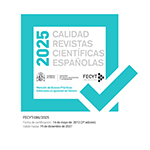Nobles and Poetry at the beginning of XVII Century
Abstract
Bearing in mind the many occupations and preoccupations of the Spanish nobility in the early modern period, it may come as a surprise to learn that poetry was one of them. What interest could a noble possibly have in poetry when, if their ambition was to secure a place at Court, what they most needed were well-run estates that would provide them with a good income. The phenomenon of the noble poet is well known, in particular the names of the foremost practitioners –the Counts of Salinas and Villamediana, the Prince of Esquilache, the Count of Rebolledo, and many more–, but less studied is how they (and others who had no pretensions to being poets) learnt the craft of being a poet and how and why they exercised it and in which situations. Some nobles did not just write poetry: they exchanged poems with each other, they satirized their contemporaries, they patronised literary academies, and they acted as patrons to other writers, and all at a time when the Court under the Duke of Lerma and Philip III became once again the centre of literary life in Spain.
Downloads
Article download
License
In order to support the global exchange of knowledge, the journal Cuadernos de Historia Moderna is allowing unrestricted access to its content as from its publication in this electronic edition, and as such it is an open-access journal. The originals published in this journal are the property of the Complutense University of Madrid and any reproduction thereof in full or in part must cite the source. All content is distributed under a Creative Commons Attribution 4.0 use and distribution licence (CC BY 4.0). This circumstance must be expressly stated in these terms where necessary. You can view the summary and the complete legal text of the licence.












